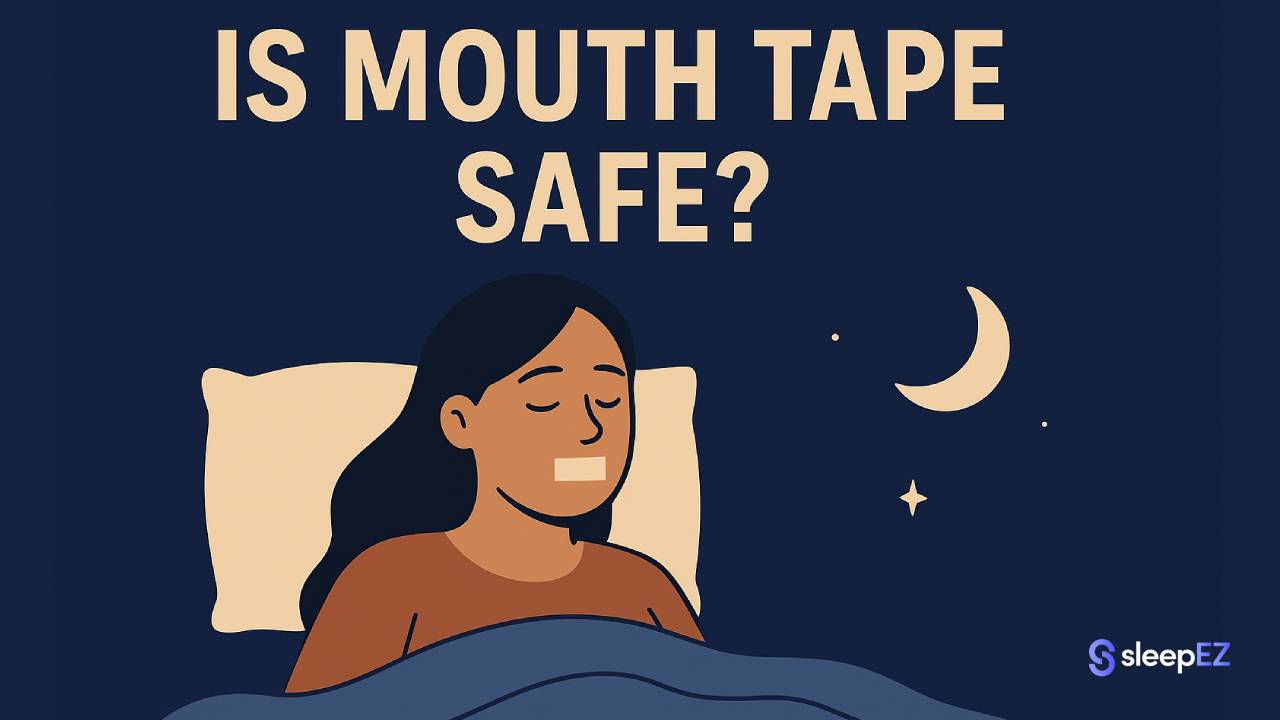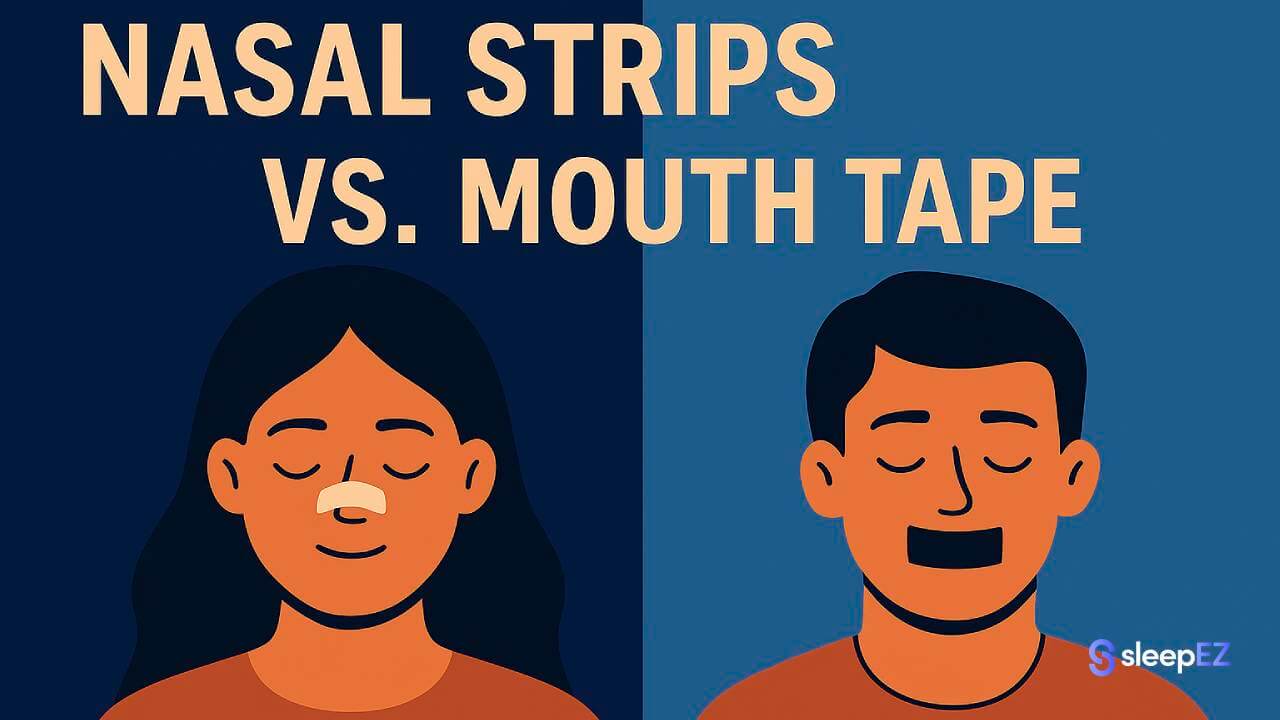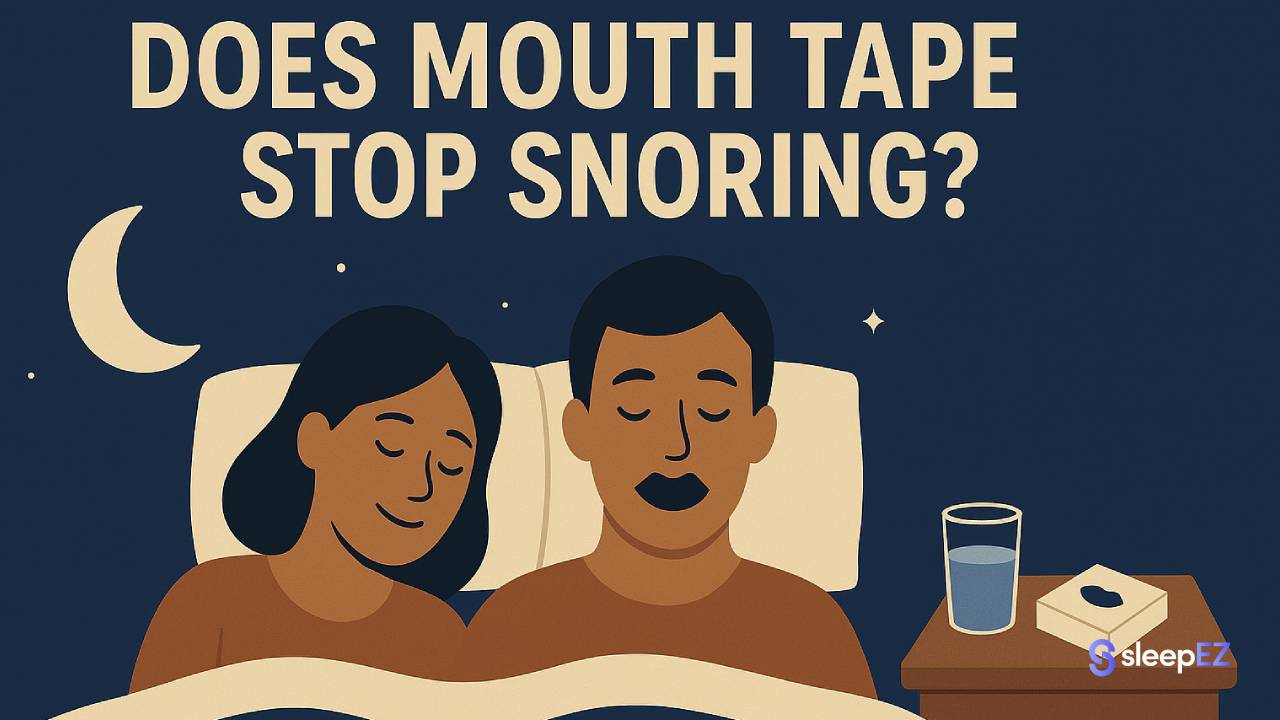Mouth taping has exploded in popularity over the past few years. People swear by it for better sleep, reduced snoring, and waking up feeling more refreshed. The idea is simple: gently encourage nasal breathing during sleep with specially designed mouth tape.
But as logical as it sounds, a big question remains: Is it actually safe to tape your mouth shut while you sleep?
This article gives you a balanced, honest look at mouth taping safety. We'll cover the real considerations, who should be cautious, and the best practices if you decide to try it. Thousands of people use mouth tape successfully every night, and by the end of this guide, you'll know exactly how to do it safely.
Read: Mouth Tape For Sleep
Is Mouth Taping Right For You?
The key to successful mouth taping is simple: it works beautifully when you're already a good candidate. Let's find out if that's you.
The Perfect Candidate Checklist
Mouth taping tends to work best for people who:
✅ Can breathe comfortably through their nose most of the time
✅ Wake up with a dry mouth or sore throat from mouth breathing
✅ Want to reduce snoring naturally
✅ Are looking to improve their sleep quality
✅ Don't have diagnosed respiratory conditions
If this sounds like you, you're likely in a great position to benefit from mouth taping.
When to Talk to Your Doctor First
Some situations require a conversation with your healthcare provider before trying mouth taping. This isn't about creating fear. It's about being smart and getting the right support for your specific situation.
Consider consulting your doctor if you have:
Nasal breathing challenges. If you have a severely deviated septum, nasal polyps, or chronic congestion, you'll want to address these first. Your doctor can help you determine if mouth taping is appropriate once your nasal breathing improves, or suggest alternative solutions.
Diagnosed sleep apnea. If you've been diagnosed with obstructive sleep apnea, have a conversation with your sleep specialist. Some doctors actually support mouth taping for mild cases as part of a comprehensive approach, but they'll want to monitor your progress and ensure it's working well with your treatment plan.
Respiratory conditions. Anyone with asthma, COPD, or other breathing conditions should get medical guidance first. Your doctor knows your situation best and can advise whether mouth taping fits into your health management.
Current illness. If you're dealing with a cold, flu, or any condition that affects your breathing or could cause nausea, wait until you're feeling better. Mouth taping works best when you're healthy.
The good news? Many doctors are becoming increasingly familiar with mouth taping and may even recommend it themselves. Don't hesitate to bring it up. You might be surprised by their support.
What to Expect:
Let's talk about what you might notice when you first try mouth taping. Understanding these common experiences helps you feel prepared and confident.
The First Night Sensation
Many people feel a bit unusual the first time they tape their mouth. The sensation of having your lips gently held together can feel unfamiliar. This is completely normal and usually fades within a few nights as you adjust.
Some users describe feeling slightly anxious at first. That's your body's natural response to something new. The feeling typically passes quickly, especially when you realize you can easily remove the tape if needed.
Skin Sensitivity
Your facial skin is delicate, which is exactly why using the right product matters so much. With proper mouth tape designed for overnight use, most people experience no skin issues at all.
If you notice any redness or irritation, it's usually a sign to try a different product or give your skin a night off. Quality mouth tape uses hypoallergenic, skin-safe adhesives that are gentle enough for nightly use.
The Breathing Confidence Question
Here's what many first-time users wonder: "What if I can't breathe?"
Your body has built-in safety mechanisms. If anything feels wrong during the night, you'll naturally open your mouth or remove the tape, often without even fully waking up. But here's the key: you shouldn't need to rely on this backup system.
The whole point is starting from a position of confidence. If you can breathe comfortably through your nose before you tape, you'll breathe comfortably through your nose while taped. Simple as that.
The Right Way to Start Mouth Taping
Success with mouth taping comes down to the right approach. Here's exactly how to do it safely and effectively.
Step 1: The Breathing Test (Do This First)
Before you ever use mouth tape at night, do this simple test. Close your mouth and take several calm, deep breaths through your nose. Can you do it comfortably for a minute or two?
If yes, great! You're ready to move forward.
If no, that's valuable information. It means you'll want to practice nasal breathing during the day first, or have a conversation with your doctor about what's causing the restriction.
Step 2: Choose the Right Product
This step is non-negotiable. Never use household tape, duct tape, or any adhesive not specifically designed for skin contact.
You need tape that is:
- Hypoallergenic and dermatologically tested
- Made with gentle, skin-safe adhesive
- Designed specifically for overnight facial use
- Easy to remove when needed
Products like Breathe Mouth Tape are specifically engineered for this purpose. They're designed with a lip-shaped fit and soft materials that hold securely during sleep but remove easily if you need them to. This addresses both effectiveness and safety in one product.
Generic adhesive products weren't made for your face. They're often too strong, too irritating, and not designed with the safety features that purpose-built mouth tape includes.
Step 3: Start During the Day
Don't jump straight into taping your mouth for eight hours. Start small and build confidence.
Try it for 15 to 20 minutes during the day while you're reading, watching TV, or working. Notice how it feels. Pay attention to your breathing. Get comfortable with the sensation in a low-pressure environment.
Once that feels easy, try it during a 30-minute nap. Then work up to longer periods. There's no rush here. You're building a new habit, and that takes time.
Step 4: Your First Full Night
When you're ready for your first overnight session, set yourself up for success:
- Make sure your nose is clear (don't try this when congested)
- Keep the tape and removal instructions near your bed
- Start on a night when you don't have early morning obligations
- Remember that some adjustment is normal
Many people sleep better their very first night. Others take a few nights to adjust. Both experiences are completely normal.
Step 5: Build the Habit
The real magic happens when mouth taping becomes part of your regular sleep routine. Most users report that within a week or two, it feels completely natural, just another part of getting ready for bed, like brushing their teeth.
What Our Customers Experience
Here's what thousands of mouth taping users report:
Within the first week: Reduced dry mouth, less morning throat soreness, and often a noticeable decrease in snoring. Partners frequently comment on the difference.
Within the first month: Improved sleep quality, waking up feeling more refreshed, and increased daytime energy. Many users say they can't imagine going back to sleeping without it.
Long-term benefits: Better nasal breathing even during the day, improved oral health (less dry mouth means better saliva flow), and sustained improvements in sleep quality.
Troubleshooting Common Questions
"The tape keeps coming off during the night"
This usually means the tape isn't adhering properly. Make sure your lips are clean and dry before applying. If it persists, you might need a different product with better adhesion designed for overnight use.
"I feel anxious with my mouth taped"
Start slower. Go back to daytime practice for a few more days. Try shorter periods at night. Remember, you're training your nervous system that this is safe, and that takes time for some people.
"My nose gets stuffy at night"
This might indicate you need to address your nasal breathing first. Consider using a saline rinse before bed, checking your bedroom's humidity levels, or talking to your doctor about what's causing the congestion.
"I woke up and the tape was off"
This is actually your body's safety system working perfectly. If you unconsciously removed it, your body might be telling you it needed mouth breathing that night. That's okay. Try again the next night when conditions are better.
The Bottom Line on Safety
For most healthy individuals who can breathe clearly through their nose, mouth taping is a straightforward way to encourage better sleep habits. When you use the right product and follow the proper approach, thousands of people successfully make it part of their nightly routine.
The key factors for safe, effective mouth taping:
- Clear nasal passages before you start
- Purpose-built tape designed for facial use
- Gradual introduction to build comfort
- Listening to your body's signals
- Medical guidance if you have any health conditions
Mouth taping isn't about forcing something unnatural. It's about supporting what your body actually prefers: nasal breathing. When you set it up correctly, it feels natural, comfortable, and genuinely helpful.
Ready to Experience Better Sleep?
If you've made it this far, you understand exactly what makes mouth taping safe and effective. You know whether you're a good candidate, how to start properly, and what to expect along the way.
The next step is simple: try it for yourself. Start with our beginner-friendly Breathe Mouth Tape, designed specifically for safety and comfort. With the right product and the guidance in this article, you're set up for success.




Leave a comment
This site is protected by hCaptcha and the hCaptcha Privacy Policy and Terms of Service apply.